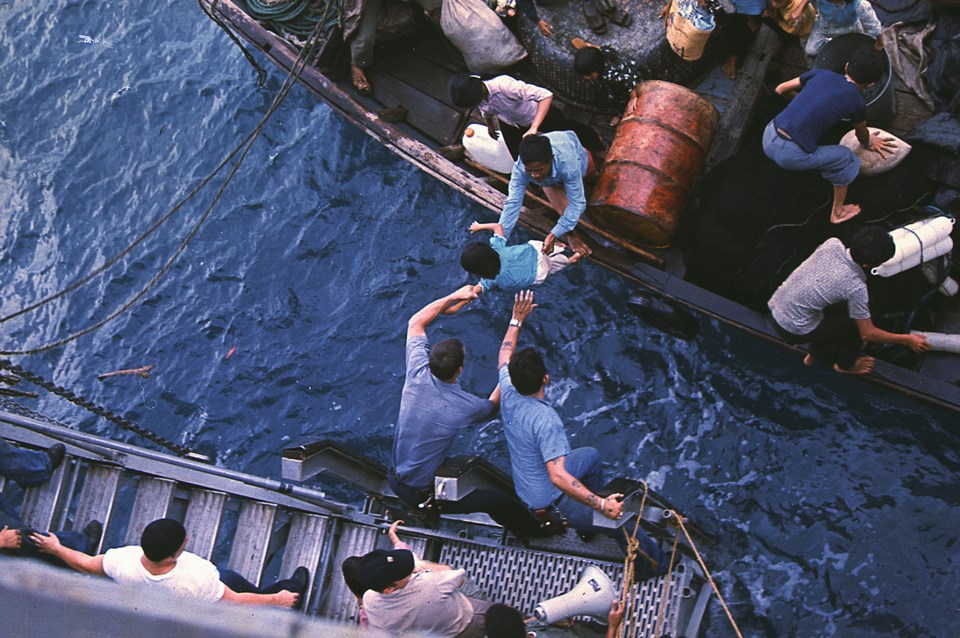A 25-year-old and his 17-year-old sister board a sketchy boat with 185 other people, leaving the rest of their family behind to join a desperate flotilla of hundreds of thousands fleeing the dystopia their country has become. The engine fails and the vessel lists aimlessly in the sea. Three passengers succumb to fatigue and lack of food.
The rest collect rain water for hydration.
This could be the eastern Mediterranean in 2016, but it is the South China Sea in the early 1980s. These refugees are not Syrians or Iraqis fleeing civil war and Islamist terror, but Vietnamese escaping the terrible aftermath of the Vietnam War, turmoil compounded by government oppression and the hardships caused by economic sanctions brought on by VietnamвҖҷs invasion of Cambodia.
Father Paul Tran, now pastor at St. JosephвҖҷs Catholic Church, between Knight Street and that bend where Commercial Drive becomes Victoria, was the young man. His experience вҖ” and that of hundreds of thousands of other вҖңboat peopleвҖқ вҖ” changed the face of communities worldwide who welcomed the Vietnamese refugees. For St. JosephвҖҷs, the refugees, including the priest, have brought about a dramatic change that saw a large Catholic parish transform from a congregation that was overwhelmingly Filipino to one dominated by Vietnamese worshipers.
Each week, multiple Vietnamese-language services take place at St. JosephвҖҷs. There are no longer any Tagalog services вҖ” though the congregation still includes a large proportion of Filipinos вҖ” because time marches on and immigrants from the Philippines now celebrate mass in English.
ItвҖҷs a large congregation, by the standards of a В鶹ҙ«ГҪУі»ӯchurch. About 1,200 families, the priest estimates, around half of whom are of Vietnamese origin or descent, most of them, Tran estimates, boat people or their descendants. A Vietnamese-language mass is offered every day but Monday and twice on Sunday. At the English-language masses, you might expect a crowd that is about 60 per cent Filipino, with the rest representing VancouverвҖҷs diversity of Caucasians, Chinese, Indian, Africans and South Americans.
It is impossible to precisely quantify how many boat people never made it to safety and TranвҖҷs story is illustrative. The boatвҖҷs engine failed and the passengers drifted for 10 days. Considering the vast openness of the sea, it was extremely fortunate that the winds ultimately pushed the boat onto an island belonging to the Philippines. В
вҖңWe thought that we were going to die,вҖқ says Tran. вҖңIf the wind pushed us far away and we didnвҖҷt land on any island, most of us would have perished on the sea.вҖқ
In addition to the other factors leading Vietnamese to flee for their lives, TranвҖҷs vocation studying for the Catholic priesthood presented an added danger. He was imprisoned for three years by the communist regime and, when he was released, he and his family concurred that he had no future in the country.
After their rescue by Filipino authorities, Tran and his sister were admitted to the United States, where he continued his studies and became a priest in 1986. He moved to Calgary in 1999 and came to В鶹ҙ«ГҪУі»ӯin 2010.
That he is the pastor at St. JosephвҖҷs parish is ironic in two ways. St. Joseph is the patron saint of Vietnam вҖ” a tradition dating back centuries to early missionaries and not, as I assumed, to the much-later French colonial experience. And, of course, it was the good fortune of Tran and the other survivors of his boat to have lived because they hit shore on an island of the Philippines all those years ago, not knowing he would ultimately lead a church congregation that was once overwhelmingly Filipino but, largely because of the boat people, would transform into a parish of Vietnamese Catholics.
Tran has been back to his country of origin a few times. The first occasion was nerve-racking, he says, because he left the country, like other boat people, without permission and he had also spent years in a communist prison. The authorities, it turned out, didnвҖҷt seem to care, he says, perhaps because he wasnвҖҷt вҖңimportant.вҖқ
With his experience, and leading a congregation made up of many refugees and their families, Tran says he feels for the Syrians and others now making treacherous treks across the Mediterranean.
вҖңNobody wants to leave their homeland,вҖқ he says. вҖңI feel sorry for them that they have to leave their own homeland, like me, but I hope that with the generosity of the government here and the people, all of us can open arms to accept them and help them to make their new life here.вҖқ
@Pat604Johnson



